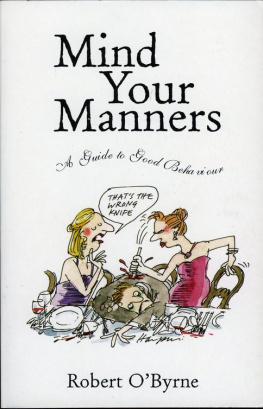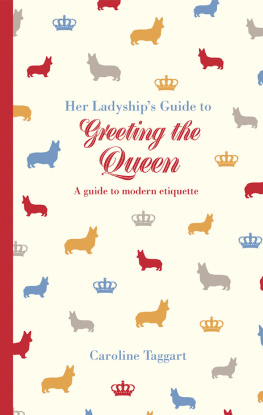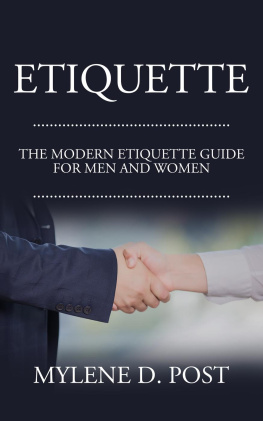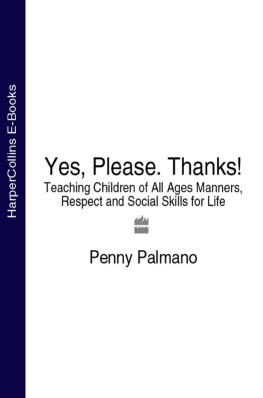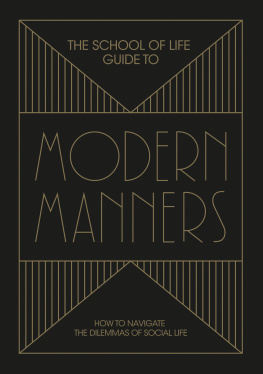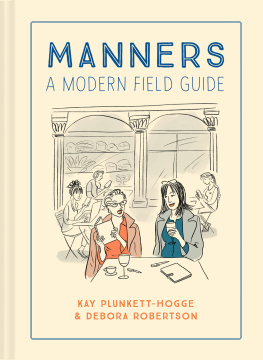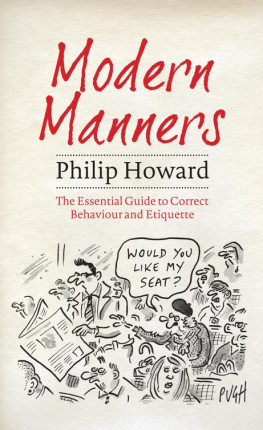PEAS & QUEUES
THE MINEFIELD OF MODERN MANNERS
SANDI TOKSVIG is a well-known broadcaster for both television and radio, hosts The News Quiz on BBC Radio 4 and is a regular panellist on BBC televisions general knowledge quiz, QI. She has written more than twenty books including fiction and non-fiction for both adults and children, most recently the Boer War novel, Valentine Grey, and is a regular columnist for Good Housekeeping magazine. In September 2012 her latest play Bully Boy was the opening production for Londons first new theatre in thirty years, the St James. Sandi is the Chancellor of Portsmouth University.
ALSO BY SANDI TOKSVIG
For Adults
Valentine Grey
Heroines & Harridans
Melted into Air
Gladys Reunited
The Travels of Lady Bulldog Burton
Flying Under Bridges
Whistling for the Elephants
Great Journeys of the World
Island Race (with John McCarthy)
For Children
Girls are Best
Hitlers Canary
The Troublesome Tooth Fairy
Super-Saver Mouse to the Rescue
Super-Saver Mouse
If I Didnt Have Elbows
Unusual Day
Tales from the Norses Mouth
PEAS & QUEUES
THE MINEFIELD OF MODERN MANNERS
SANDI TOKSVIG

First published in Great Britain in 2013 by
PROFILE BOOKS LTD
3A Exmouth House
Pine Street
London EC1R 0JH
www.profilebooks.com
This eBook edition published in 2013
Copyright Sandi Toksvig
The moral right of the author has been asserted.
This eBook is copyright material and must not be copied, reproduced, transferred, distributed, leased, licensed or publicly performed or used in any way except as specifically permitted in writing by the publishers, as allowed under the terms and conditions under which it was purchased or as strictly permitted by applicable copyright law. Any unauthorised distribution or use of this text may be a direct infringement of the authors and publishers rights and those responsible may be liable in law accordingly.
A CIP catalogue record for this book is available from the British Library.
eISBN 978 1 84765 866 1
for Mary
CONTENTS
TO THE READER
In 1530 when Erasmus of Rotterdam wrote his book on manners, De civilitate morum puerilium (On Civility in Boys), he directed his advice to the eleven-year-old son of the Prince of Veere, Henry of Burgundy. The instructions were in Latin. I follow in his footsteps by addressing this volume to a delightful child in my life called Mary. She is eight at present. This is not a book for children, but she and I have had many conversations about manners. Her behaviour is splendid, but nevertheless one day she may need a volume to reach for as matters arise in her life. I hope as she becomes a grown-up that this is it. It is impossible to imagine every type of encounter or situation which a person might face so I have stuck to the most general ones in the order most likely to occur. Although Mary was the inspiration for this book I hope it will also prove useful to anyone not planning to live as a hermit. I have made it easier for her (and you) by not using Latin (very much).
TO BEGIN: AN INTRODUCTION
WHY DO WE NEED GOOD MANNERS?
Nobody knows the age of the human race, but everybody agrees that it is old enough to know better.
Author unknown
Dear Mary
This bit of a book is usually referred to as The Introduction. Its the section most likely to be skipped by a reader so you may wonder why the author bothered. If you do just want to crack on with the basics of manners then by all means move along, but if you want to know why you should pay attention to them at all then it might be interesting. At any rate do be polite enough to at least give it a go, seeing as Ive made the effort to write it.
Sit up straight? How annoying
Two points straight away:
The first thing to say is that basic manners apply no matter where you are or what you are doing. They are even a good idea when no one is watching. Having a code of behaviour will help you know how to react to the unexpected.
The second point is to assure you that manners are not some new notion invented by the present generation of old fogies to annoy youngsters. The fact is that, on the whole, human beings dont live in isolation from each other nor do they want to. Think how delighted Robinson Crusoe was when Man Friday turned up. If were not going to live alone on a desert island then we need to find ways to get on. Irritatingly we cant all just do what we like. Imagine the chaos there would be on the roads. Manners are simply an expression of how we manage the tricky art of co-existing. A good starting point for this is to show kindness and consideration to others and every society has and has had some basic notion about this.
Most religions have spent a lot of time working out how you ought to behave and most of them have what is known as
The Golden Rule
For example, the Mahabharata of Hinduism declares, This is the sum of duty; do naught unto others what would cause pain if done to you, while the Jewish Talmud instructs What is hateful to you, do not do to your fellowman. This is the entire Law; all the rest is commentary and the Christian Bible follows on with Thou shalt love thy neighbour as thyself. Sounds a simple plan which, if you follow it, should set you off on the right foot.
MANNERS MAKETH THE MAN (AND THE WOMAN, THE KID, THE DOG )
A mans manners are a mirror in which he shows his portrait.
Johann Wolfgang von Goethe (17491832), German writer
The general notion is that how you are seen to behave says something about the kind of person you are. Worrying about what impact your behaviour has on other people means you are thinking about someone other than yourself. Its not about using the right fork or addressing royalty correctly, its about doing your best to be a considerate member of the community. We have rules because predictable behaviour can be very comforting. It is nice to know what to do if you attend an event, which is why there are so many helpful hints about things like formal dinners, works functions, weddings and funerals. These are stages in life which will come up for us all and its good to have a game plan.
Minding your Ps and Qs
The expression mind your Ps and Qs, meaning be on your best behaviour, has been around for so long that no one can quite recall where it came from. There are many candidates:
1. It was a foreshortened admonishment to children to remember to say Please and Thank you.
2. It was a seventeenth-century admonishment for drinkers to keep an eye on how many pints and quarts they consumed.
3. It was an eighteenth-century admonishment for sailors to pay attention to their peas (a sailors pea coat) and queues (a traditional nautical ponytail).
I could carry on through history seeking a meaning via the Norman Invasion of 1066, specific reading symbols in Medieval Latin texts or how early printers might easily confuse lowercase Ps and Qs but we have too much to do to get sidetracked. The fact that we dont know the precise origin of the phrase seems appropriate, for minding your Ps and Qs at all is far from an exact science.
Next page

